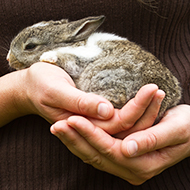
Owners urged to do their research around the pandemic's most popular pet.
Demand for pets has soared since the start of the pandemic, as people have spent more time at home than ever before. New data has revealed that rabbits are one of the most popular pets sought during lockdown, with an increase of 212 per cent in rabbits purchased in 2020 compared with 2019.
The data, provided by pet insurance comparison website quotezone.co.uk, is based on a sample of more than 80,000 pet insurance policies. The sales figures for rabbits far exceed the increases seen in puppies (55 per cent) or kittens (58 per cent), over the past 12 months.
The most sought-after rabbit breed was the lop-mini, closely followed by mixed-breeds and lionhead rabbits.
The price for a rabbit has also risen by 17 per cent, meaning that people looking to purchase one as a pet will likely be paying around £50 per rabbit.
Rabbits are a popular pet around Easter especially, with many parents purchasing the animals as a present for their children. But animal charities across the country are urging potential rabbit owners to do their research, to ensure that their new pet's needs will be met.
Data from the RSPCA shows that May is the busiest time for rabbit rehoming in its centres and branches. The charity's rabbit specialist, Dr Jane Tyson, said: “Sadly, when rabbits are bought on impulse, an owner may not realise how complex they are to care for and what a commitment caring for rabbits can be.
“Rabbits are arguably one of the most neglected pets in Britain despite being much-loved by many. Loving pet owners will understand their complex needs but unfortunately some of the common misconceptions about housing and diet are still prevalent today.”



 The Veterinary Medicines Directorate (VMD) is inviting applications from veterinary students to attend a one-week extramural studies (EMS) placement in July 2026.
The Veterinary Medicines Directorate (VMD) is inviting applications from veterinary students to attend a one-week extramural studies (EMS) placement in July 2026.